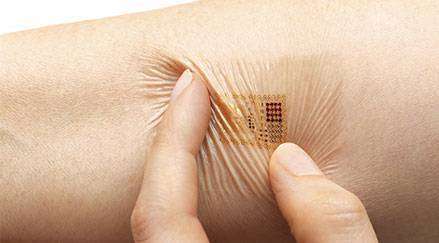June 1, 2013 weblog
Motorola on authentication: We're talking tattoos and pills

(Phys.org) —Motorola's CEO Dennis Woodside along with the company's senior vice present for advanced technology took to the All Things Digital stage this week to reveal what they think about the future of passwords—namely, authentication by way of arm tattoos and pills. Regina Dugan, senior vice president for advanced technology and projects, first revealed the company's interest in exploring an electronic tattoo for use as a wearable password. This electronic tattoo, behaving as a kind of barcode, works with sensors and antennas able to recognize the user's smartphone. The tattoo concept belongs to MC10, a Cambridge, Massachusetts-based firm. Their tattoos, known as biostamps, were designed to track a person's health; Motorola sees the arm stamps as feasible for use as authentication.
MC10, whose motto is "reshaping electronics," from the outset wanted to provide an alternative to bulky medical devices, asking instead, "What if electronics were soft and pliable? What if electronics conformed to us, instead of us conforming to them?" They have been on a course of reshaping electronics into products that bend, stretch, and flex. They developed the arm tattoo for the skin in the form of a patch can be placed on the skin. Motorola intends to work with them on an electronic tattoo for authentication.
Dugan, who formerly was director at the Defense Advanced Research Projects Agency (DARPA), is among technology thought leaders who believe it's high time for thinking up better methods for authentication. She said at the conference that authentication was irritating. "After 40 years of advances in computation, we're still authenticating basically the same way we did years ago."
Yet another idea that captures Motorola's interest, she said, belongs in the category of ingestible sensor technology: a pill from Redwood City, California based Proteus Digital Health. The latter has developed a way to make a sensor-embedded pill that you can swallow and which is then powered by the acid in your stomach—and Motorola is interested in that pill as a means for authentication. In that concept, the pill creates an 18-bit signal in your body—and your body becomes one walking authentication token. A user would authenticate identity just by touching a phone, computer or car.
© 2013 Phys.org



















